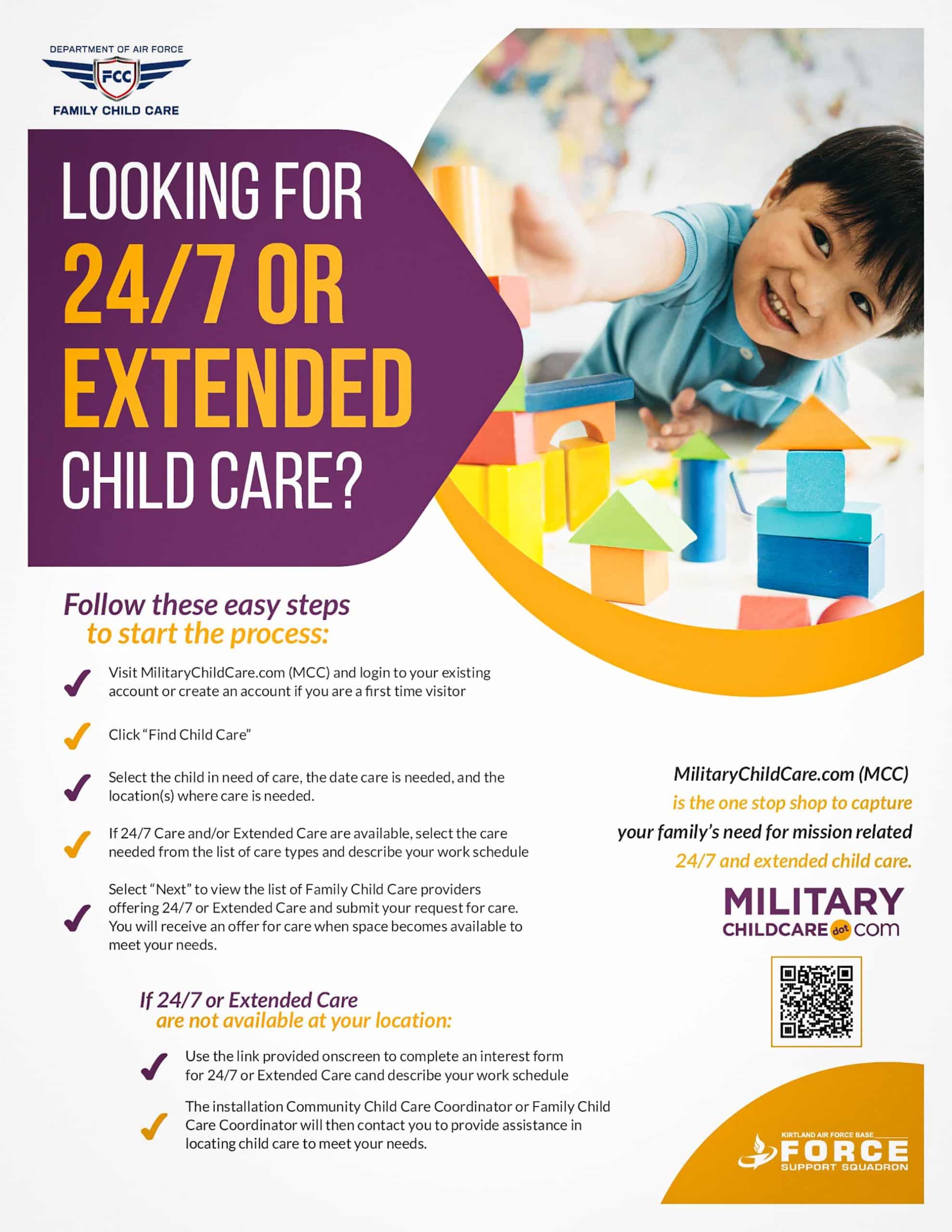
Child Development Centers
We are extremely proud of the Kirtland Air Force Base Child Development Centers (CDC’s) facilities and the dynamic programs available to your children! Our centers are accredited by the National Association for the Education of Young Children and certified by the Department of Defense (DoD). Our policies and Procedures are based on Air Force Instruction 34-144, Department of Defense Instruction 6060.2, Air Force Inspection Checklist and local operation instructions.
The CDCs offer care, guidance, and developmental activities for your children while you fulfill your obligations to the Air Force or enjoy educational, recreational, or social opportunities. A schedule of activities, including meal and nap times, is posted in each area. This is a flexible schedule which allows Child & Youth Program Assistants to respond to children’s individual needs and provide you with general times for scheduled activities.
Our Motivation
Our Philosophy
The practices of the Air Force Child Development Programs are based on current knowledge of child development and early childhood education. We are responsible for supporting the development of the whole child, meaning all areas of development are considered inter-related and equally important. Our program acknowledges that children learn through active, hands-on involvement with their environment, peers, and caring adults. We respect each child’s unique interests, experiences, abilities and needs, thus allowing us to be responsive to and appropriate for each child. Children are valued as individuals, as well as part of a group. Likewise, our program respects and supports the ideals, cultures, and values of families in their task of nurturing children. We advocate for children, families, and the early childhood professionals within our programs.
Our Goal
- Foster positive identity and sense of emotional well-being
- Enhance social skills
- Encourage children to think, reason, question children to think, reason, question, and experiment
- Promote language and literacy development
- Build physical development and skills
- Support sound health, safety, and nutritional practices
- Advance creative expression, representation, and appreciation for the arts
- Appreciate and respect cultural diversity
- Develop initiative and decision-making skills
Desired Outcomes
- Children will experience growth and learning in their social, emotional, physical, language, and cognitive development
- Children will develop a positive sense of self as valued members of the community
- Children will progressively gain social competence and display pro-social behaviors by connecting with peers in ways that build self-worth and belonging
- Children will gain competence in problem solving strategies, understanding of concepts and relationships, develop logical, representational, and symbolic thinking skills and to take initiative and make relevant decisions
- Children will gain competence in their home language to include ability to communicate through language, to discriminate the sounds of language, to ask/answer questions, to gain understanding of print and concepts, and to make sense of printing
- Children will display a progressively higher level of competence in their gross and fine motor skills, hand-eye coordination, mobility and balance
- Children will develop creativity using art, drama, and movement to express and develop their uniqueness
- Families will feel supported and nurtured in their child rearing effort
- Families will experience greater support in dealing with the challenges of life in a military community
- Families experiencing lengthy separations due to deployments will be supported via formal or informal parent/staff support groups and networks with other community agencies
- Families will gain insight into their child’s development through the collaborative teacher parent partnership through relevant, intentional, systematic observation and assessment
Programs
Reserved Regular Care is provided through an annual reserved regular care agreement. If you wish to use the CDC on a regular basis, it is necessary to obtain a reserved space for your child. In order to do so, you must sign an agreement outlining the conditions and terms for maintaining guaranteed regular care in the center. Hourly Care An hourly care agreement and forms must be completely filled out before reservations for hourly care can be made. Hourly care is provided on a non-recurring or irregular basis for children 6 weeks through 5 years of age. There is a minimum reservation of two hours and care cannot exceed 20 hours per child per week. Hourly care is not an alternative to regular care use. Reservations for hourly care are made on a space-available basis up to one month in advance. Reservations can be made at the front desk by calling either of our facilities. Children will be accepted on a “walk-in” basis if space and staff are available
Curriculum
The activities we plan for children – how we organize the environment, select toys and materials, plan the daily schedules, and talk with children – are all designed to accomplish the goals of our curriculum and give your child a successful start in school. “The Creative Curriculum” is the country’s leading scientifically based, research-validated, comprehensive curriculum that guides teaching literacy, mathematics, science, and social studies. Our materials show teachers not only what to teach but how and why. This inclusive, strengths-based approach is appropriate for all children, including dual-language learners and children with disabilities.
Our program implements developmentally appropriate activities that promote the social, emotional, cognitive, and physical development of children enrolled. Our programs have Training and Curriculum Specialists who provide staff training on implementing the curriculum and other safety, health, and child abuse prevention requirements following Air Force and DoD requirements.
The Air Force Child Development Program Screening and Assessment Plan was developed based on the principles outlined in the Joint Position Statement of the National Association for the Education of Young Children (NAEYC) and the National Association of Early Childhood Specialist in State Departments of Education (NAECS/SDE). This plan is not just a formality; it’s a standardized framework for the developmentally appropriate evaluation of young children’s strengths, interests, progress, and needs. It helps us adapt and improve the classroom curriculum and practices, ensuring your child’s development is always our top priority. The plan also provides guidance on the evaluation methods used, the timelines for evaluation, the uses of the results, and the involvement of families. Our assessment tools are tailored for each age group. For more information, click on the age group to see the assessment form used in our centers.
Accreditation
Both CDCs are currently accredited by the National Association for the Education of Young Children (NAEYC). NAEYC Accreditation represents the mark of quality in early childhood education. To achieve NAEYC Accreditation, early childhood education programs volunteer to be measured against the most robust and rigorous national standards on education, health, and safety. By engaging in self-study and pursuing NAEYC Accreditation, programs discover that they create a stronger and more committed team of teachers, administrators, and families who work together to improve program quality continually. Teachers and administrators find their work more rewarding. Families appreciate and seek out NAEYC-accredited programs for their children. In the spring of 2008, both programs scored exceptionally well during our reaccreditation process and have maintained accreditation.
A Parent Advisory Board (PAB), consisting of appointed parents of children attending Child Development Programs (CDPs), provides recommendations for improving parent involvement and valuable input on the program’s operations. The goal of this group is to enhance the overall satisfaction of parents, children, and staff. We encourage all parents to become involved.
CDC Extras
Give Parents a Break
This program offers free childcare for parents experiencing stress due to deployment, on temporary duty or on a remote tour, caring for a child with special needs, an emergency situation, such as the illness of a family member, the family recently moving to the base or other unique family circumstances or hardships.
Give Parents a Break is held at the Gibson CDC. The Air Force Aid Society sponsors and funds the program, providing up to 4 hours of free childcare per month to families with special circumstances, who are referred by a helping agency. Usually on the first Friday of every month from 6:30 – 10:30 Pm (except when otherwise noted). The care is provided at the Gibson Child Development Center (6 weeks to 6 years) and the Youth Center (ages 6 through 12 years); Reservations are taken on space available basis.
We ask you to register children in the program before reservations are accepted. Forms need for registration are:
- Air Force Youth Flight Patron Registration
- Proof of current immunizations
- Physical (6 Weeks to provide)
- Medical evaluations for children with special needs
- Parent Agreement
If your family is experiencing any of the situations above or you think you might benefit from a few hours break from parenting responsibilities, talk with any of the following about a referral.
- Airman & Family Readiness
- The staff of the Child Development Centers, the Youth Center, the Family Child Care Office, the Family Support Center, or the – Family Advocacy Office
- Your Unit Commander or First Sergeant
- An Air Force chaplain
Parents Night Out
This program runs concurrently on the same days and times as “Give Parents A Break” and is also available at the Gibson CDC; children six weeks through five are eligible, and the cost is $15.00 per child for the evening. At the Youth Center, children ages 6 through 12 years are eligible; the cost is $15 per child. Program requirements are the same as for “Give Parents A Break.” Give Parents a Break is held at the Gibson CDC and Youth Center. For more information about Give Parents a Break or Parent’s Night Out, contact the Gibson CDC at 846.1103 or the Youth Center at 853.5437, 853.KIDS.
How to Request Care
To request care, you must create an account at www.militarychildcare.com. All dependents, ages 6 weeks to 5 years, of active duty military/DoD civilian employees may use the CDCs following Air Force priorities. The CDCs operate at capacity during some periods; therefore, space may not always be available for all children. Care for children with physical, mental, or emotional disabilities or those requiring special diets, special procedures, medication for chronic illness, or other special attention – cannot be cared for or registered on the waiting list without a referral to the CDC Director or designee for evaluation.
All dependents, ages 6 weeks to 5 years, of active duty military/DoD civilian employees may use the CDCs per Air Force priorities. Bona Fide houseguests of eligible patrons may use the CDCs on a space-available drop-in basis. The CDCs operate at capacity during some periods; therefore, space may not always be available for all children. Care of children with physical, mental, or emotional disabilities or those requiring special diets, special procedures, medication for a chronic illness, or other special attention – may require paperwork to be completed before starting. Don’t hesitate to contact the CDC Director or designee for more information.
Registration Forms & Information
When a slot is available for your child, the CDC staff will set up an appointment and provide information on the facilities, give you a tour, and provide initial orientations. If you drop in without an appointment, the staff will happily provide you with registration information. Still, it may not be able to accept new registrations or re-registrations due to the daily in-processing and out-processing of established patrons.
To register in the program, you must bring:
- DoD identification to establish eligibility
- Your child’s current immunization records to the center.
- A current leave/Earnings Statement and or payslip for every adult member of the household or student schedule.
CDC will provide forms for you to fill out:
- A health evaluation for your child within 6 weeks of enrollment.
- A form must be completely filled out and signed for each eligible child; a completed form includes a local emergency contact, other than the sponsor and his/her spouse, their phone number, and proof of up-to-date immunizations
- You will also be provided a copy of our Parent Handbook to review before your child starting our program.
It is your responsibility to ensure immunizations are up-to-date or child care may be denied. You must bring each child’s immunization records to the center for verification. Per AFI 34-144, Child Development Centers, all children must receive immunizations recommended by Air Force policy. Failure to do so could cause loss of the available slot for your child.
All records are kept Confidential and will be maintained at the front desk, and only those staff with a need to know will have access to them.
Certified written notification from a physician is required for any special care a child may need, any food substitutions, or any allergies a child may have before your child receives care.
The entire registration package must be completed in its entirety before receiving childcare.
Additional Forms
Upcoming Events



